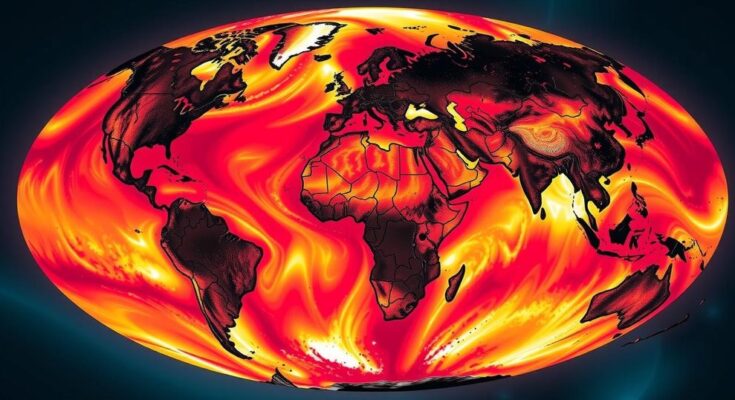Climate science agencies confirm that 2024 has recorded the highest global temperatures ever, building on 2023’s alarming trends. The findings highlight a disturbing escalation in extreme weather events linked to anthropogenic climate change, including record sea temperatures and flooding. Authorities emphasize the critical need for immediate global actions to reduce greenhouse gas emissions in line with the goals of the Paris Climate Agreement to prevent cataclysmic impacts on human and environmental systems.
Climate authorities from the U.S., U.K., Europe, and Japan announced that 2024 has marked another record-breaking year in terms of global temperatures due to escalating greenhouse gas emissions. Reports indicate that annual average sea surface temperatures and atmospheric water vapor levels have also reached new highs, leading to severe weather conditions such as intense storms and flooding globally. Samantha Burgess, Deputy Director of the Copernicus Climate Change Service, emphasized that these conditions have created significant challenges worldwide, stating, “These high global temperatures, coupled with record global atmospheric water vapor levels in 2024, meant unprecedented heat waves and heavy rainfall events, causing misery for millions of people.”
Furthermore, Gavin Schmidt, Director of NASA’s Goddard Institute for Space Studies, reiterated the direct link between human-induced climate change and the rising frequency of extreme weather events, explaining, “It is very clear that the heat waves we are seeing would not be happening, intense rainfalls we are seeing almost everywhere would not be happening without anthropogenic warming.” The extreme climate phenomena witnessed in 2024 include Hurricane Helene, which tragically resulted in over 230 fatalities across various U.S. states, as well as significant droughts and flooding impacting regions from Mexico to South America.
Scientists have identified multiple factors contributing to this alarming trend, notably the early El Niño cycle and changes in global cloud cover that allow for increased solar radiation to warm the Earth’s surface. However, the predominant cause remains the accumulation of greenhouse gases, primarily from fossil fuel combustion. Schmidt warned, “The global mean temperature will continue to rise as long as we continue to emit greenhouse gases.”
Each year of the past decade has been recorded among the hottest, and 2023 occasionally breached the critical threshold of 1.5 degrees Celsius above preindustrial averages. Burgess highlighted that this current trajectory poses significant risks, as we approach a crucial limit defined in the Paris Climate Agreement aimed at mitigating dangerous climate impacts. Michael E. Mann, a climate scientist at the University of Pennsylvania, cautioned that at current emission rates, the world may see temperatures exceeding 1.5 degrees Celsius in the near future.
As climate agencies release these concerning findings, the situation is underscored by significant weather events, including catastrophic wildfires in Southern California, illustrating the immediate consequences of climate change. Mann remarked on this urgency, stating, “We can already see the devastating consequences of the warming we’ve already experienced, in the form of the apocalyptic wildfires currently ravaging Southern California.”
The article examines the alarming reality that 2024 has been identified as Earth’s hottest year to date, surpassing the previous year’s record. Leading climate organizations have reported an increase in global temperatures, sea surface temperatures, and atmospheric moisture that correlate with increasingly severe weather events. The piece underscores the linkage between human activity—particularly fossil fuel consumption—and climate change, presenting a case for urgent action to mitigate its impacts. The implications of these findings touch upon international climate agreements aimed at stabilizing global warming below critical thresholds to avert catastrophic consequences.
This report serves as a stark reminder of the escalating effects of climate change, evidenced by the record temperatures and associated severe weather events recorded in 2024. The data corroborate the urgent need for global policies aimed at reducing greenhouse gas emissions. As various experts warn, the continuity of our present trajectory will lead to irreversible climate damage, necessitating immediate action to safeguard our planet’s future.
Original Source: www.newsweek.com




